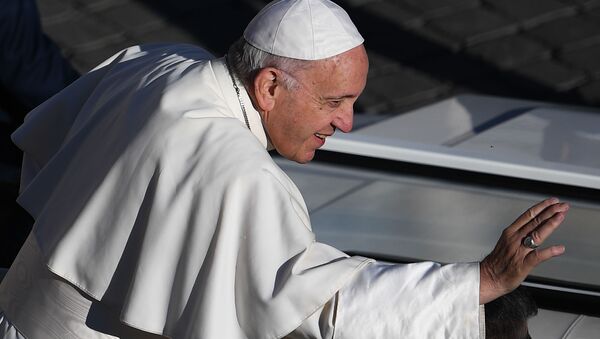Pope Francis has prompted heated debates by approving changes to the Lord’s Prayer, replacing the centuries-old verses “lead us not into temptation” from Matthew 6:13 with “do not let us fall into temptation”. Some have even urged to “fire” the current head of the Catholic Church.
The correction, reportedly enacted on 22 May, was preceded by 16 years of research and months of debates. The pontiff first signalled that he favoured changing the line in 2017. The passage itself is a translation from the Latin Vulgate Bible, translated, from the ancient Greek in the fourth century. In a televised interview, Francis stated that the version currently in use is not a “good translation” of the original since God does not lead one to sin.
“A father does not (lead us into temptation), a father helps you to get up immediately”, Francis said at the time.
Despite the support of Catholic authorities, the move has left the Christian community split. The Christian Post cited chair of the New Testament Department at Deerfield’s Trinity Evangelical Divinity School David W. Pao, as saying that the new version "does not represent the best reading of the Greek text nor does it exhaust the meaning of this petition”.
"First, this ‘permissive’ reading is not explicitly expressed in the Greek of Matthew 6:13a, and ‘lead us not into temptation’ remains the best and most natural rendering of this petition”, he noted.
According to the theologian, "the petition likely assumes the presence (and the coming) of periods of testing, and this petition should then be understood as a call to God for protecting His people from falling into sin in the midst of such testing”.
READ MORE: Pope Francis Compares Abortions to 'Hiring a Hitman'
President of The Southern Baptist Theological Seminary Albert Mohler, who authored a book on the Lord’s Prayer, told The Seattle Times that he was “shocked and appalled”, noting that this is not “the pope’s prayer”.
At the same time, editor of Catholic World News Philip F. Lawler has slammed Francis’ criticism of the prayer as “not reasonable” and took aim at the pontiff in an interview with The New York Times.
"Pope Francis has made a habit of saying things that throw people into confusion, and this is one of them. It just makes you wonder, where does it stop, what's up for grabs. It's cumulative unease”, he noted.
Some took this criticism further, calling on the pontiff to resign.
Pope Francis to CHANGE the Lord's Prayer...
— Chuck Callesto (@ChuckCallesto) June 5, 2019
This is like changing the DECLARATION of INDEPENDENCE....
Raise your hand if you think someone should FIRE the Pope...https://t.co/PEptqy72Zi
An outrageous change to the LORD'S PRAYER by POPE FRANCIS altering again the Word of God. Just resign. He knows full well that prayer loses its power when you change it up like that! #POPEFRANCIS pic.twitter.com/jGmyQnOL6T
— Sandra L. Henriksen (@REBORNFromAbove) June 6, 2019
However, some stood up for the pope, saying it is not about changing the prayer itself.
The bible was not written in English. The people who translated from Hebrew and Greek plus Latin made errors. If the same prayer is in Latin it already means DO NOT LET US. So lets stop petty arguments of simanyi changing scripture. This is translating not changing
— Omukiga.com (@RaymondMpamizo) June 5, 2019
The Bible was written by man, and so it can be amended by him by whatever disguised means.
— ThatLawyerCk (@EricMamanzi) June 4, 2019
Is it a change though? Really? I get why he did it... honestly.
— The Catholic Texan (@TheCatholicTex) June 6, 2019
Pope Francis made this big change to Lord's Prayerhttps://t.co/GNxm1CbwWm


